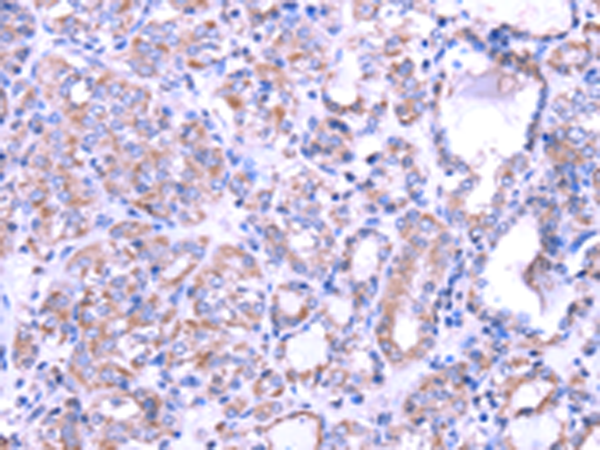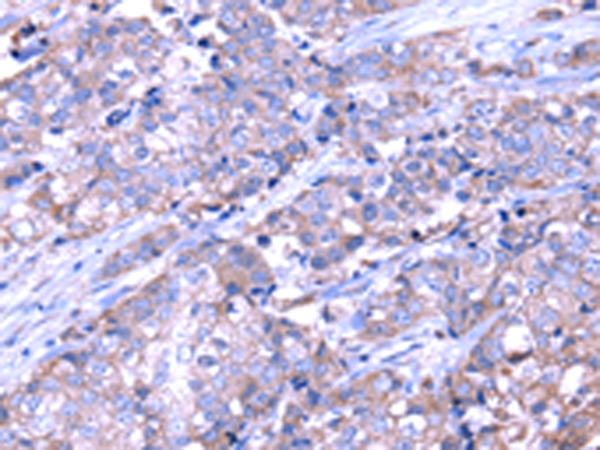

| WB | 咨询技术 | Human,Mouse,Rat |
| IF | 咨询技术 | Human,Mouse,Rat |
| IHC | 1/30-1/150 | Human,Mouse,Rat |
| ICC | 技术咨询 | Human,Mouse,Rat |
| FCM | 咨询技术 | Human,Mouse,Rat |
| Elisa | 1/2000-1/10000 | Human,Mouse,Rat |
| Aliases | SFRSK1 |
| Host/Isotype | Rabbit IgG |
| Antibody Type | Primary antibody |
| Storage | Store at 4°C short term. Aliquot and store at -20°C long term. Avoid freeze/thaw cycles. |
| Species Reactivity | Human, Mouse |
| Immunogen | Fusion protein of human SRPK1 |
| Formulation | Purified antibody in PBS with 0.05% sodium azide and 50% glycerol. |
+ +
以下是3-4条关于SRPK1抗体的参考文献及摘要概括:
---
1. **文献名称**:*"SRPK1 inhibition modulates VEGF splicing to reduce pathological neovascularization in a rodent model of retinopathy"*
**作者**:Amin, E.M., et al.
**摘要概括**:该研究通过使用特异性SRPK1抗体,揭示了SRPK1在调控VEGF剪接中的作用,证明抑制SRPK1可减少病理性血管生成,为糖尿病视网膜病变等疾病提供了潜在治疗策略。
---
2. **文献名称**:*"SRPK1 promotes tumor cell invasion through regulation of the PI3K/AKT signaling pathway in colorectal cancer"*
**作者**:Zhou, B., et al.
**摘要概括**:作者利用SRPK1抗体进行免疫组化和Western blot分析,发现SRPK1通过激活PI3K/AKT通路促进结直肠癌细胞侵袭,提示其作为癌症治疗靶点的潜力。
---
3. **文献名称**:*"Development of a monoclonal antibody targeting SRPK1 and its therapeutic potential in prostate cancer"*
**作者**:Gout, S., et al.
**摘要概括**:研究报道了一种新型抗SRPK1单克隆抗体的开发,验证其在体外和体内抑制前列腺癌细胞增殖的效果,并揭示其通过调控剪接因子磷酸化发挥作用。
---
4. **文献名称**:*"SRPK1-mediated phosphorylation of SRSF1 drives androgen receptor signaling and prostate cancer progression"*
**作者**:Mavrou, A., et al.
**摘要概括**:通过SRPK1抗体的功能实验,研究发现SRPK1通过磷酸化剪接因子SRSF1增强雄激素受体信号通路,促进前列腺癌转移,为靶向SRPK1的药物设计提供依据。
---
这些文献均涉及SRPK1抗体的应用或相关机制研究,涵盖疾病模型、分子通路及治疗开发方向。
SRPK1 (Serine-Arginine Protein Kinase 1) is a key enzyme involved in regulating pre-mRNA splicing by phosphorylating serine-arginine (SR) repeat domains in splicing factors. This phosphorylation modulates the subcellular localization and activity of SR proteins, influencing spliceosome assembly and alternative splicing decisions. SRPK1 dysregulation has been implicated in various diseases, including cancer, viral infections, and neurological disorders. In cancer, SRPK1 overexpression promotes angiogenesis, metastasis, and chemoresistance by altering splicing of oncogenic transcripts like VEGF. It also interacts with viral proteins to facilitate replication in certain infections.
SRPK1 antibodies are essential tools for studying its expression, localization, and function. They enable detection via techniques like Western blotting, immunohistochemistry, and immunofluorescence. Researchers use these antibodies to explore SRPK1's role in disease mechanisms and assess its potential as a therapeutic target. Small-molecule inhibitors of SRPK1 are under investigation for cancer therapy, emphasizing the need for reliable antibodies to validate target engagement and downstream effects. Specific SRPK1 antibodies also help distinguish it from related kinases (e.g., SRPK2) in functional studies. As aberrant splicing emerges as a hallmark of many diseases, SRPK1 remains a focal point for understanding post-transcriptional gene regulation.
×